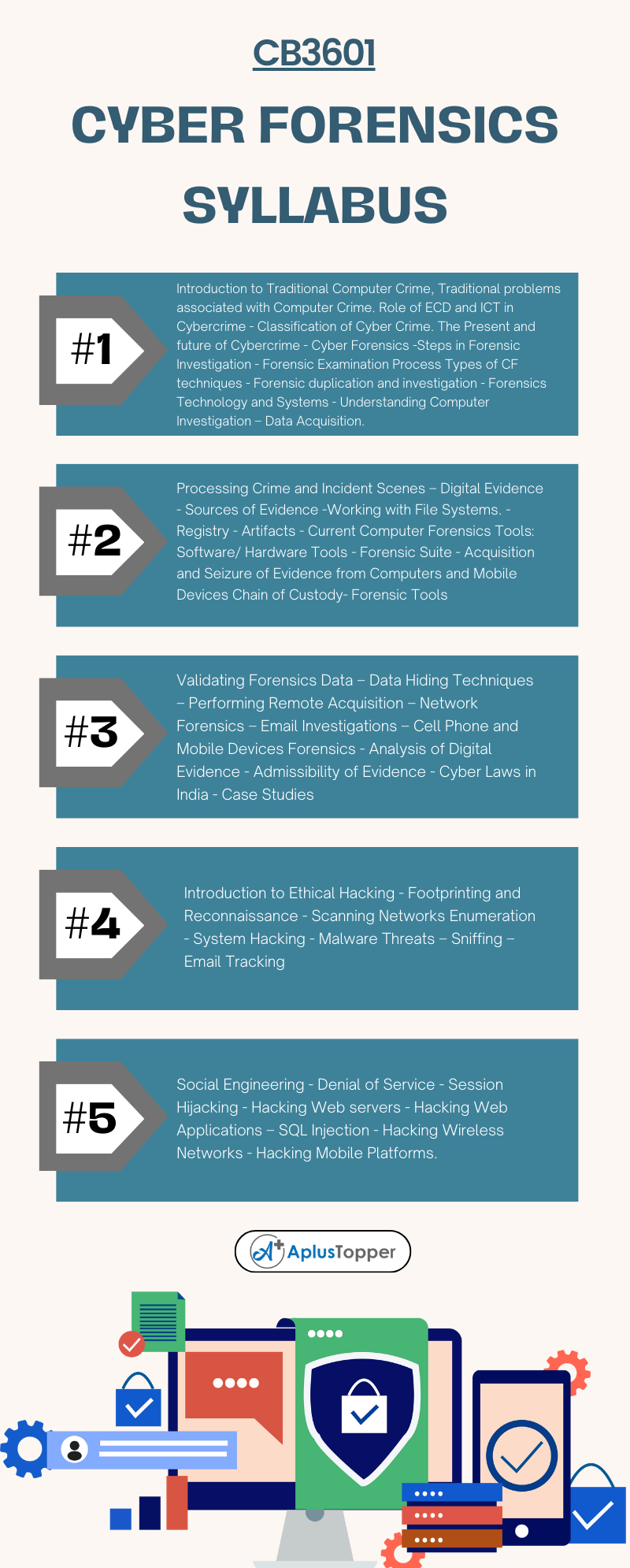Subject code CB3601 deals with the Cyber Forensics subject. In this article, we try to provide the syllabus of the CB3601 Cyber Forensics syllabus based on the Affiliated Institutions of Anna University 2021 Regulation syllabus.
If you see nowadays, students are requesting brief descriptions of anything they want to know. Today social media platforms and search engines are running information throughout the world, just by searching the concept by the people. Especially when it comes to education, every subject in any field has been provided. There is a lot of demand to provide accurate education information in the market. Among them is aplustopper.com tries to give the best of its content for students. In this article, the CB3601 – Cyber Forensics Syllabus is given briefly without getting rid of a single concept of the subject from the Anna University B.E Computer Science and Engineering (Cyber security) syllabus.
If you want to know more about the syllabus of B.E Computer Science and Engineering (Cyber security) Syllabus connected to an affiliated institution’s four-year undergraduate degree program. We provide you with a detailed Year-wise, semester-wise, and Subject-wise syllabus in the following link B.E Computer Science and Engineering (Cyber security) Syllabus Anna University, Regulation 2021.
Aim Of Concept:
- To learn cyber crime and forensics
- To become familiar with forensics tools
- To learn to analyze and validate forensics data
- To understand cyber laws and the admissibility of evidence with case studies
- To learn the vulnerabilities in network infrastructure with ethical hacking
CB3601 – Cyber Forensics Syllabus
Unit I: Introduction To Cyber Crime And Forensics
Introduction to Traditional Computer Crime, Traditional problems associated with Computer Crime. Role of ECD and ICT in Cybercrime – Classification of Cyber Crime. The Present and future of Cybercrime – Cyber Forensics -Steps in Forensic Investigation – Forensic Examination Process Types of CF techniques – Forensic duplication and investigation – Forensics Technology and Systems – Understanding Computer Investigation – Data Acquisition.
Unit II: Evidence Collection And Forensics Tools
Processing Crime and Incident Scenes – Digital Evidence – Sources of Evidence -Working with File Systems. – Registry – Artifacts – Current Computer Forensics Tools: Software/ Hardware Tools – Forensic Suite – Acquisition and Seizure of Evidence from Computers and Mobile Devices Chain of Custody- Forensic Tools
Unit III: Analysis And Validation
Validating Forensics Data – Data Hiding Techniques – Performing Remote Acquisition – Network Forensics – Email Investigations – Cell Phone and Mobile Devices Forensics – Analysis of Digital Evidence – Admissibility of Evidence – Cyber Laws in India – Case Studies
Unit IV: Ethical Hacking
Introduction to Ethical Hacking – Footprinting and Reconnaissance – Scanning Networks Enumeration – System Hacking – Malware Threats – Sniffing – Email Tracking
Unit V: Ethical Hacking In Web
Social Engineering – Denial of Service – Session Hijacking – Hacking Web servers – Hacking Web Applications – SQL Injection – Hacking Wireless Networks – Hacking Mobile Platforms.

Practical Exercises:
- Study and Explore the following forensic tools:
(a) FTK Imager
(b) Autopsy
(c) EnCase Forensic Imager
(d) LastActivityView
(e) USBDeview - Recover deleted files using FTKImager
- Acquire forensic image of hard disk using EnCase Forensics Imager and also perform integrity checking/validation
- Restore the Evidence Image using EnCase Forensics Imager.
- Study the following:
(a) Collect Email Evidence in Victim PC.
(b) Extract Browser Artifacts (ChromeHistory view for Google Chrome) - Use USBDeview to find the last connected USB to the system
- Perform Live Forensics Case Investigation using Autopsy
- Study Email Tracking and Email Tracing and write a report on them.
Text Books:
- Bill Nelson, Amelia Phillips, Christopher Steuart, ― Guide to Computer Forensics and Investigations‖, Cengage Learning, India Sixth Edition, 2019.
- CEH Official Certified Ethical Hacking Review Guide, Wiley India Edition, Version 11, 2021.
- Dejey, S. Murugan – Cyber Forensics, Oxford University Press, India, 2018
Reference Books:
- John R.Vacca, “Computer Forensics “, Cengage Learning, 2005.
- MarjieT.Britz, “Computer Forensics and Cyber Crime: An Introduction 3rd Edition, Prentice Hall, 2013.
- AnkitFadia “ Ethical Hacking, Second Edition, Macmillan India Ltd, 2006.
- Kenneth C.Brancik “Insider Computer FraudII Auerbach Publications Taylor &Francis Group– 2008.
Related Posts On Semester V:
Must Read For More:
